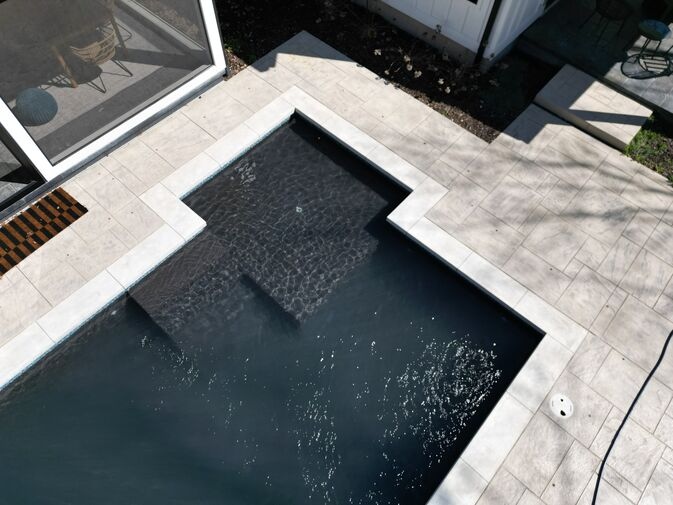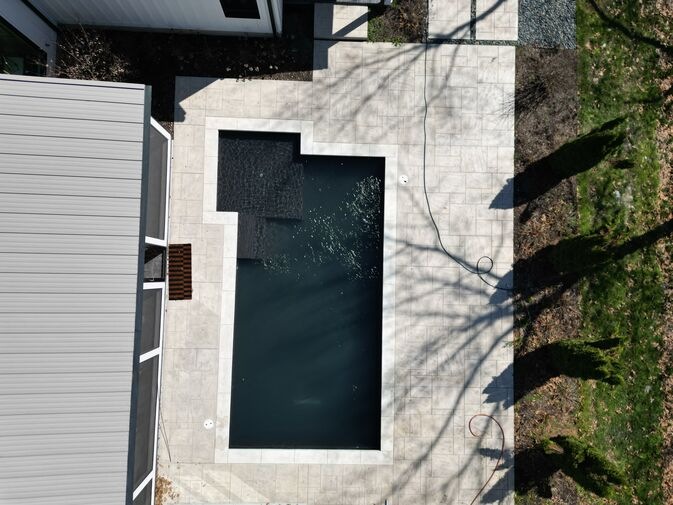Having a pool is one of life’s simple joys, but it also comes with its share of responsibilities. Pools use a significant amount of water, energy, and chemicals, and if not managed properly, they can quickly become costly for both your wallet and the environment. That is why, in 2025, more homeowners are choosing to make their pools more sustainable. An eco-friendly pool not only helps reduce waste and pollution but also saves you money in the long run. With a few smart choices, you can enjoy your pool while knowing you are making a positive difference.
Why Eco-Friendly Pools Matter in 2025

In 2025, sustainability is no longer just a trend, it is a necessity. The cost of water and electricity continues to rise, and many regions face frequent droughts and high utility bills. Having a pool that uses fewer resources is a big help. By focusing on eco-friendly solutions, you not only lower costs but also play your part in protecting the environment.
Pools that are not managed sustainably can waste thousands of gallons of water annually, consume substantial amounts of electricity, and necessitate chemical treatments that may harm both humans and the environment. On the other hand, an eco-friendly pool is designed to be efficient. It utilizes modern systems, smarter maintenance methods, and eco-conscious habits to strike a balance between fun and responsibility.
Save Water with Smart Pool Practices
Water conservation is one of the most important aspects of pool ownership. Here are some simple ways you can reduce water waste:
- Use a pool cover: A cover prevents water from evaporating, which can save thousands of gallons per year. It also keeps leaves and dirt out, which means you will spend less time cleaning and less money on chemicals.
- Install a water-saving filter or pump system: Traditional filters waste a lot of water during backwashing. Modern cartridge filters or variable-speed pumps use significantly less water while maintaining your pool’s cleanliness.
- Fix leaks quickly: Even a small leak can waste a surprising amount of water over time. Regularly check for leaks and repair them promptly to prevent water loss.
- Landscape wisely: Planting shade trees or installing windbreaks around your pool can reduce evaporation. Using drought-tolerant plants around your pool also reduces water usage for landscaping.
- Harvest rainwater: In some areas, you can collect rainwater and use it to top off your pool. This is an easy way to recycle natural resources.
Energy-Efficient Pool Upgrades
Pools can consume a significant amount of electricity, particularly when it comes to pumps, heaters, and lighting. Switching to energy-efficient equipment will help cut your energy bills:
- Variable-speed pumps: These pumps are far more efficient than single-speed models. They allow you to adjust the flow according to your needs and can reduce energy use by up to 70 percent. According to the U.S. Department of Energy, combining a smaller, more efficient pump with reduced operating time can cut pool pump energy use by up to 75% compared to older systems.
- Efficient heaters: Gas heaters are becoming less popular as people move toward solar heaters, heat pumps, or hybrid systems. Solar heaters utilize the sun’s power and require almost no maintenance once installed. Heat pumps are another good choice, as they use less energy to keep water warm.
- LED lighting: Replacing traditional pool lights with LED bulbs reduces electricity use and provides better, brighter light that lasts for years.
- Smart pool automation: Modern technology enables the automation of pumps, lights, and heaters. Smart timers ensure that equipment operates only when necessary, reducing waste.
Eco-Friendly Pool Maintenance
How you care for your pool makes a significant difference in its eco-friendliness. A few changes in your maintenance routine can have a big impact:
- Switch to saltwater or mineral systems: Saltwater pools are gentler on the skin and require fewer chemicals compared to traditional chlorine pools. Mineral systems are another option that uses magnesium or copper to keep the pool clean.
- Use natural cleaning products: Avoid harsh chemicals when possible. Many eco-friendly alternatives are safe for swimmers and the environment.
- Robotic pool cleaners: These cleaners use less energy than traditional cleaning systems and also cut down on chemical use by improving water circulation.
- Stay on top of regular maintenance: Clean your filters and check chemical levels regularly to ensure optimal performance. Keeping your pool balanced means you will not need to use extra chemicals to fix problems later.
Reduce Chemical Use
Chlorine is the most commonly used chemical in pools, but excessive amounts can cause problems. Luckily, there are eco-friendly ways to keep your water safe:
- UV and ozone systems: These systems disinfect water naturally and reduce the need for chlorine.
- Keep water balanced: By keeping pH and alkalinity at proper levels, you reduce the risk of algae growth. That means less need for shock treatments.
- Natural alternatives: Baking soda, borates, or enzyme-based treatments can often replace or reduce traditional chemical use.
Eco-Friendly Pool Design and Renovation Ideas
If you are building a new pool or thinking about remodeling, there are many ways to make eco-friendly choices:
- Natural pools: Instead of using chlorine, these pools rely on plants and natural filters to maintain clean water. They look beautiful and are completely chemical-free.
- Solar heating: Installing solar panels or a solar pool cover can significantly reduce energy use.
- Smaller designs: Modern pools are trending toward smaller, more efficient sizes. They use less water, require fewer chemicals, and are easier to maintain.
- Recycled materials: Consider decking, tiles, or landscaping materials made from recycled products. They are durable and environmentally friendly.
Money-Saving Benefits of Going Green
Going eco-friendly is not only good for the planet, but it is also good for your wallet. Here are some ways you can save:
- Lower water bills due to reduced evaporation and fewer leaks.
- Reduced energy costs from efficient pumps, heaters, and lighting.
- Spending less on chemicals and cleaners.
- Pool equipment that lasts longer because it is not overworked.
- Increased property value since eco-friendly features are attractive to buyers.
Eco-Friendly Pool Trends for 2025
In 2025, an increasing number of pool owners are opting for sustainable options. Some of the biggest trends include:
- Growing use of smart pool technology for automation and efficiency.
- Wider adoption of solar-powered heating systems.
- Rising popularity of natural swimming pools.
- Possible government incentives or rebates for installing energy-efficient equipment, depending on your location.
Quick Everyday Habits for a Greener Pool
Not every eco-friendly change requires a significant investment. Small habits can also make a difference:
- Cover your pool when it is not in use.
- Run pumps and filters during off-peak hours to reduce energy costs.
- Skim and clean regularly to prevent buildup and reduce chemical needs.
- Encourage swimmers to rinse off before entering the pool to keep the water cleaner longer.
Conclusion
Owning a pool should be about fun and relaxation, not stress over high bills or wasted resources. The good news is that with the right choices, your pool can be both enjoyable and eco-friendly. By saving water, upgrading to energy-efficient equipment, reducing chemical use, and practicing smart maintenance, you are not only protecting the environment but also saving money.
If you are ready to explore eco-friendly upgrades or need help maintaining your pool in a sustainable way, BC Pools is here to help. Serving Northwest Arkansas, we specialize in modern, efficient, and environmentally friendly pool services.
Contact Us today to speak with our team and learn how we can help you create a greener pool.
Get a Free Quote and discover the best options for your pool upgrade in 2025.


